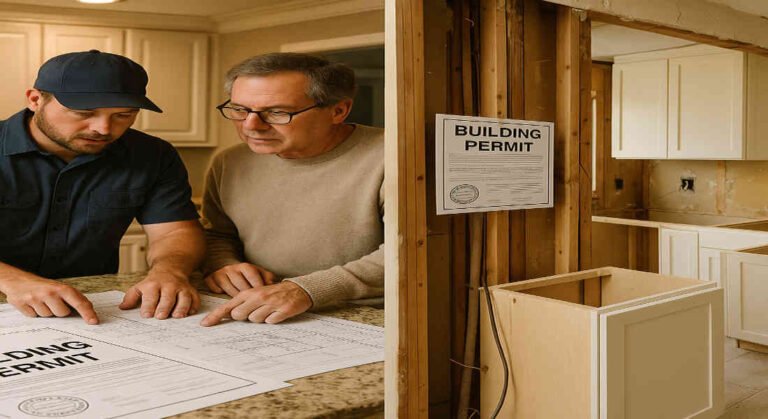Kitchen remodeling is one of the most popular home improvement projects, and for good reason. A well-designed kitchen can significantly enhance your home’s functionality, add value to your property, and create a space where family and friends love to gather. However, before you dive into tearing down walls or installing shiny new appliances, there’s one critical question you must ask yourself: “Do I need a permit for a home kitchen remodel?”
Understanding When You Need a Permit for a Kitchen Remodel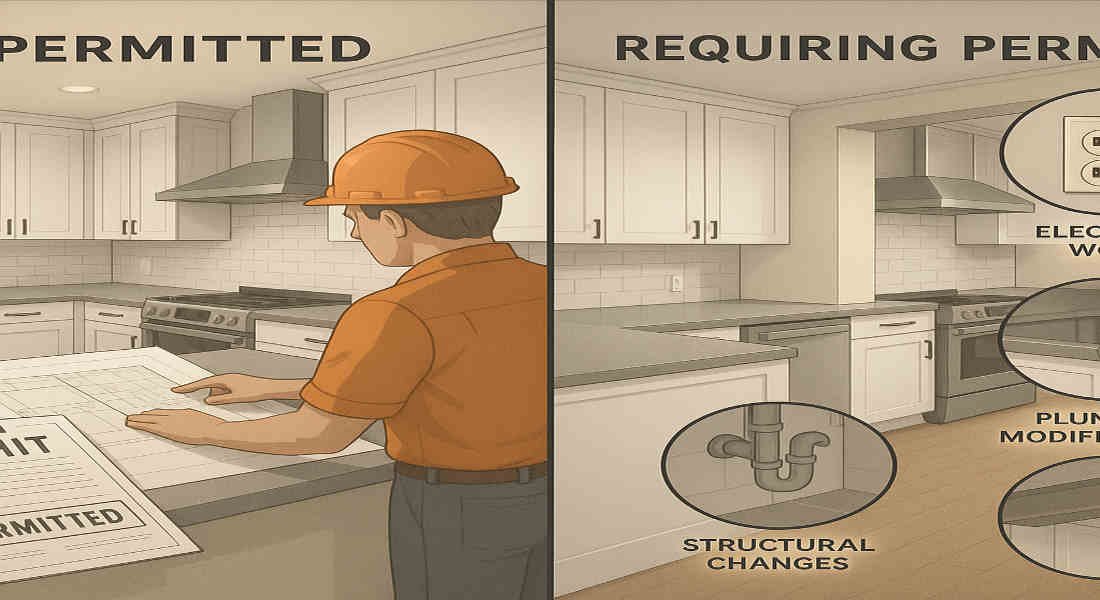
Before we dive into the specific permits, let’s first address why permits are necessary and when they are required.
What is a Permit, and Why is it Important?
A permit is an official approval from your local government that allows you to proceed with specific construction or renovation work. Permits exist to enforce building codes, which are designed to ensure safety, durability, and compliance with legal standards. These codes encompass a wide range of topics, including structural integrity, fire safety, and environmental impact.
Without the necessary permits, you may face issues such as fines, delays, or even having to undo completed work. Worse, a remodel done without permits could compromise the safety of your home and future occupants.
Factors That Determine Permit Requirements
Whether or not you need a permit depends on the following factors:
- Scope of Work: Minor cosmetic updates, such as painting or replacing cabinets, may not require permits; however, structural, electrical, and plumbing changes almost always do.
- Local Regulations: Permit requirements vary significantly depending on your location. Always check with your local building department for specific requirements.
- Type of Renovation: Projects involving changes to walls, wiring, plumbing, or HVAC systems are more likely to require permits.
Cosmetic Updates vs. Structural Changes
To answer the focus question, “Do I need a permit for a home kitchen remodel?” consider this simple rule:
- No permit needed: Cosmetic updates like painting, installing new light fixtures, or replacing countertops and cabinets (without layout changes).
- Permit required: Structural changes, electrical rewiring, plumbing upgrades, or anything involving gas lines or HVAC systems.
Structural Permits
Structural permits are essential if your remodel affects the physical framework of your home.
What Are Structural Permits?
Structural permits are required for projects that involve altering the layout or structure of your kitchen. This could include removing or adding walls, expanding the kitchen space, or creating new openings for windows and doors.
Examples of Work Requiring Structural Permits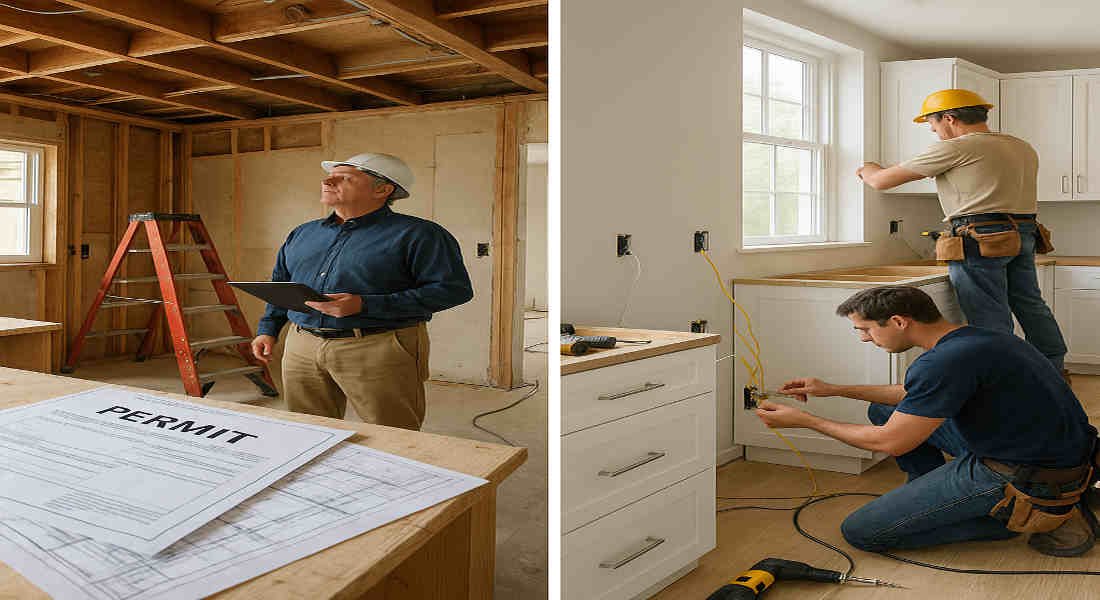
- Knocking down a load-bearing wall to create an open-concept kitchen
- Adding an island that requires changes to the floor structure
- Enlarging a window or creating a new door leading outside
You may also read (how do i get rid of sticky floors at home).
Why Structural Permits Matter
Structural changes can affect the stability of your home. A properly permitted project ensures that the work complies with engineering standards, thereby preventing issues such as sagging floors or collapsing walls.
How to Apply for a Structural Permit
To obtain a structural permit, you’ll typically need:
- Detailed plans or drawings of the proposed changes
- Engineering reports (if required)
- An application submitted to your local building department
Consequences of Skipping Structural Permits
Performing structural changes without a permit can lead to severe consequences, including fines, denial of insurance claims, and even being required to demolish the unpermitted work.
Electrical Permits
Electrical work is a crucial aspect of any kitchen remodel, particularly when upgrading or relocating outlets, appliances, or lighting.
When Are Electrical Permits Required?
You’ll need an electrical permit if your remodel involves:
- Installing new circuits for high-powered appliances
- Adding or relocating outlets and switches
- Upgrading the kitchen’s electrical wiring to meet modern standards
Why Electrical Permits Are Crucial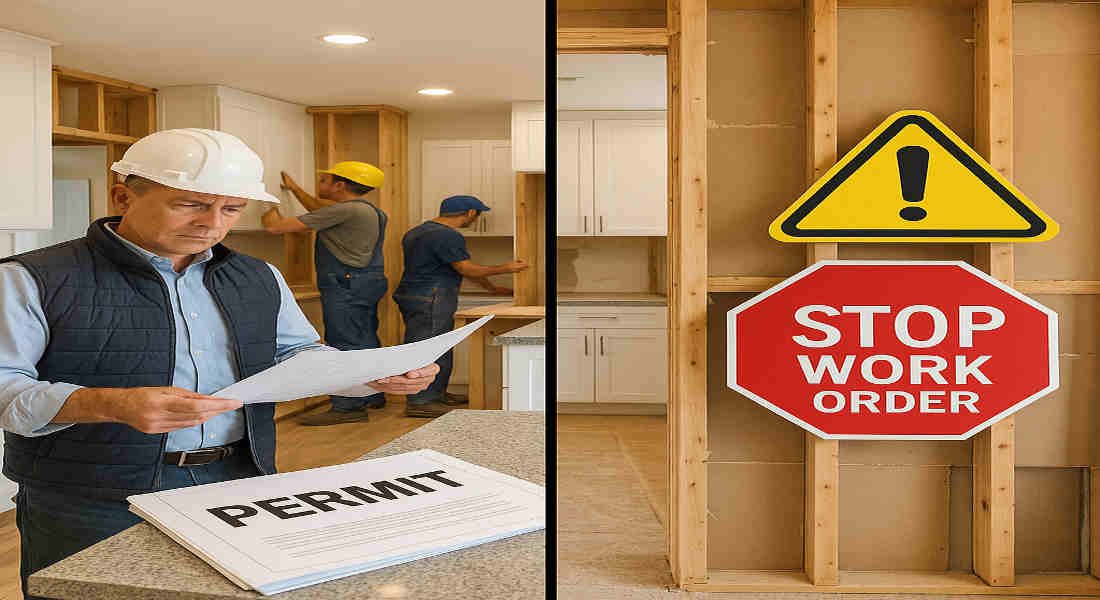
Electrical permits are necessary to ensure the safety and reliability of your kitchen’s electrical system. Improper wiring can lead to dangers like electrical fires, shocks, or appliance malfunctions.
Inspection Process for Electrical Work
After obtaining your electrical permit, an inspector will visit your home to verify that the work has been completed correctly and complies with building codes. Passing this inspection ensures that your electrical system is safe and in good working order.
Tips for Success
- Hire a Licensed Electrician: Electrical work is complex and should be handled by a professional.
- Prepare for Inspections: Ensure the worksite is accessible and that all wiring is visible to the inspector.
Plumbing Permits
If your kitchen remodel involves water or gas lines, a plumbing permit is likely required.
When Do You Need a Plumbing Permit?
A plumbing permit is necessary for projects such as:
- Moving sinks, dishwashers, or refrigerators with water lines
- Adding new plumbing fixtures
- Altering gas lines for stoves or ovens
Why Plumbing Permits Are Important
Plumbing work impacts the health and safety of your home. Proper permitting ensures that water supply and drainage systems are correctly installed, preventing leaks, contamination, or flooding.
How to Obtain a Plumbing Permit
The process involves submitting a detailed plan of the changes, paying a fee, and scheduling inspections to confirm the work meets code requirements.
Mechanical Permits (HVAC and Gas Lines)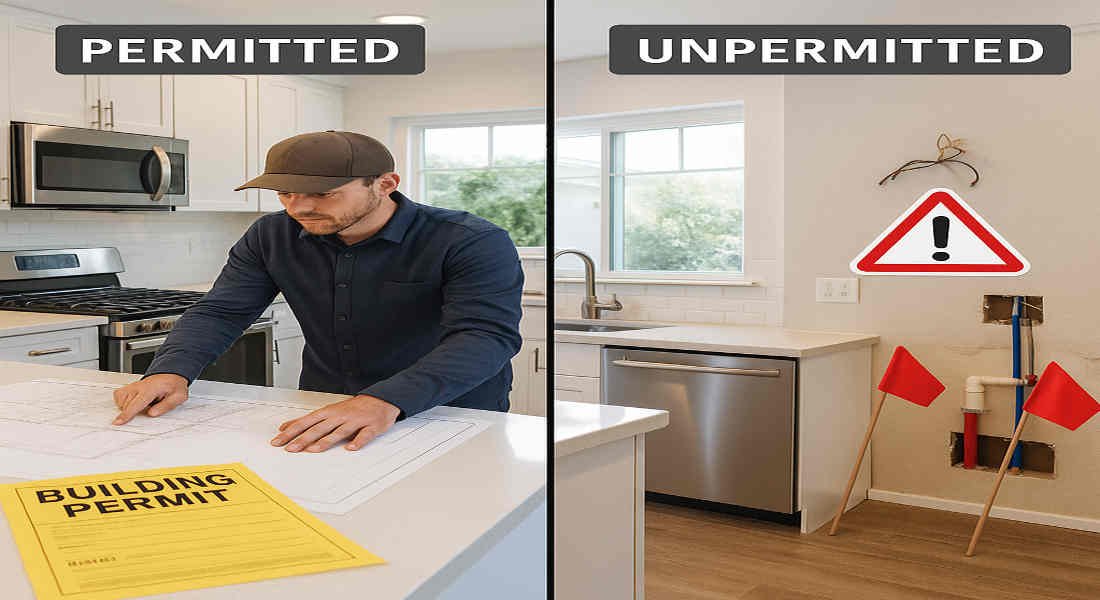
Mechanical permits are required for changes involving your home’s heating, ventilation, air conditioning (HVAC) systems, and gas lines.
Examples of Mechanical Work Requiring Permits
- Installing a new gas stove or oven
- Adding or upgrading ventilation systems (e.g., range hoods, exhaust fans)
- Extending or modifying ductwork
Why Mechanical Permits Are Critical
Mechanical permits ensure that your HVAC and gas systems are safe and efficient. Improper installation can lead to issues such as gas leaks, carbon monoxide poisoning, or inadequate air circulation.
Steps to Obtain a Mechanical Permit
- Submit your plans to the building department.
- Hire a qualified contractor for the work.
- Schedule inspections to verify compliance
Additional Permits and Considerations
Depending on your location, you may need other permits or approvals for your kitchen remodel.
Zoning and Environmental Permits
In some areas, zoning laws or environmental regulations may impact your remodel. For example, if you live in a historic district, you may require special approval for exterior modifications.
When Permits Are NOT Required
You generally don’t need permits for minor cosmetic updates, such as:
- Painting walls
- Replacing cabinet doors or hardware
- Installing new countertops (without layout changes)
Confirming Permit Requirements
To avoid surprises, always check with your local building department or consult a licensed contractor for guidance.
How to Check and Obtain Permits for Your Kitchen Remodel
Here’s a step-by-step guide to navigating the permit process:
- Contact Local Authorities: Reach out to your city or county building department to confirm what permits you need.
- Consult Professionals: Licensed contractors or designers can help you understand local codes and prepare the necessary documents.
- Submit Plans: Provide detailed drawings or blueprints of your remodel for review.
- Pay Fees: Permit fees vary depending on the scope of work and location.
- Schedule Inspections: Most permits require inspections to ensure the work is done correctly.
Pro Tip: Start the permit process early to avoid delays in your remodel timeline.
Risks of Remodeling Without Proper Permits
Skipping permits might seem like a way to save time or money, but it can lead to significant consequences:
- Legal Issues: Fines, stop-work orders, or being forced to undo the work.
- Safety Risks: Electrical fires, plumbing failures, or structural instability.
- Resale Problems: Potential buyers may hesitate if work is done without obtaining the necessary permits.
You may also read (the truth about drains in home kitchen faucets).
